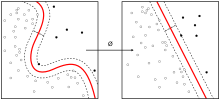Proper generalized decomposition
The proper generalized decomposition (PGD) is an iterative numerical method for solving boundary value problems (BVPs), that is, partial differential equations constrained by a set of boundary conditions. The PGD algorithm computes an approximation of the solution of the BVP by successive enrichment. This means that, in each iteration, a new component (or mode) is computed and added to the approximation. The more modes obtained, the closer the approximation is to its theoretical solution. By selecting only the first PGD modes, a reduced order model of the solution is obtained. Because of this, PGD is considered a dimensionality reduction algorithm.
| Part of a series on |
| Machine learning and data mining |
|---|
 |
|
Theory |
|
Machine-learning venues |
Description
The proper generalized decomposition is a method characterized by (1) a variational formulation of the problem, (2) a discretization of the domain in the style of the finite element method, (3) the assumption that the solution can be approximated as a separated representation and (4) a numerical greedy algorithm to find the solution.[1][2]
The most implemented variational formulation in PGD is the Bubnov-Galerkin method,[3][4] although other implementations exist.[5][3]
The discretization of the domain is a well defined set of procedures that cover (a) the creation of finite element meshes, (b) the definition of basis function on reference elements (also called shape functions) and (c) the mapping of reference elements onto the elements of the mesh.
PGD assumes that the solution u of a (multidimensional) problem can be approximated as a separated representation of the form
where the number of addends N and the functional products X1(x1), X2(x2), ..., Xd(xd), each depending on a variable (or variables), are unknown beforehand.
The solution is sought by applying a greedy algorithm, usually the fixed point algorithm, to the weak formulation of the problem. For each iteration i of the algorithm, a mode of the solution is computed. Each mode consists of a set of numerical values of the functional products X1(x1), ..., Xd(xd), which enrich the approximation of the solution. Note that due to the greedy nature of the algorithm, the term 'enrich' is used rather than 'improve'. The number of computed modes required to obtain an approximation of the solution below a certain error threshold depends on the stop criterium of the iterative algorithm.
Unlike PCA, PGD modes are not necessarily orthogonal to each other.
Features
PGD is suitable for solving high-dimensional problems, since it overcomes the limitations of classical approaches. In particular, PGD avoids the curse of dimensionality, as solving decoupled problems is computationally much less expensive than solving multidimensional problems.
Therefore, PGD enables to re-adapt parametric problems into a multidimensional framework by setting the parameters of the problem as extra coordinates:
where a series of functional products K1(k1), K2(k2), ..., Kp(kp), each depending on a parameter (or parameters), has been incorporated to the equation.
In this case, the obtained approximation of the solution is called computational vademecum: a general meta-model containing all the particular solutions for every possible value of the involved parameters.[6]
References
- Amine Ammar, Béchir Mokdad, Francisco Chinesta, Roland Keunings (2006). "A New Family of Solvers for Some Classes of Multidimensional Partial Differential Equations Encountered in Kinetic Theory Modeling of Complex Fluids". Journal of Non-Newtonian Fluid Mechanics.CS1 maint: multiple names: authors list (link)
- Amine Ammar, Béchir Mokdad, Francisco Chinesta, Roland Keunings (2007). "A new family of solvers for some classes of multidimensional partial differential equations encountered in kinetic theory modelling of complex fluids. Part II: Transient simulation using space-time separated representations". Journal of Non-Newtonian Fluid Mechanics.CS1 maint: multiple names: authors list (link)
- Croft, Thomas Lloyd David (2015-04-09). Proper generalised decompositions: theory and applications (phd thesis). Cardiff University.
- Chinesta, Francisco; Keunings, Roland; Leygue, Adrien (2014). The Proper Generalized Decomposition for Advanced Numerical Simulations: A Primer. SpringerBriefs in Applied Sciences and Technology. Springer International Publishing. ISBN 978-3-319-02864-4.
- Aguado, José Vicente (18 Nov 2018). "Advanced strategies for the separated formulation of problems in the Proper Generalized Decomposition framework".
- Francisco Chinesta, Adrien Leygue, Felipe Bordeu, Elías Cueto, David Gonzalez, Amine Ammar, Antonio Huerta (2013). "PGD-Based Computational Vademecum for Efficient Design, Optimization and Control". Archives of Computational Methods in Engineering.CS1 maint: multiple names: authors list (link)